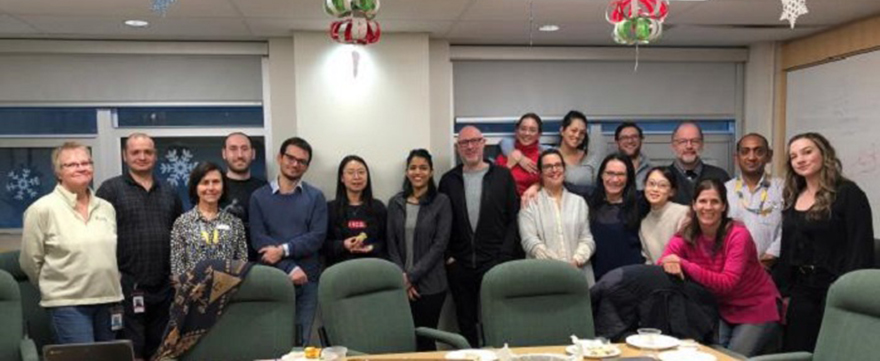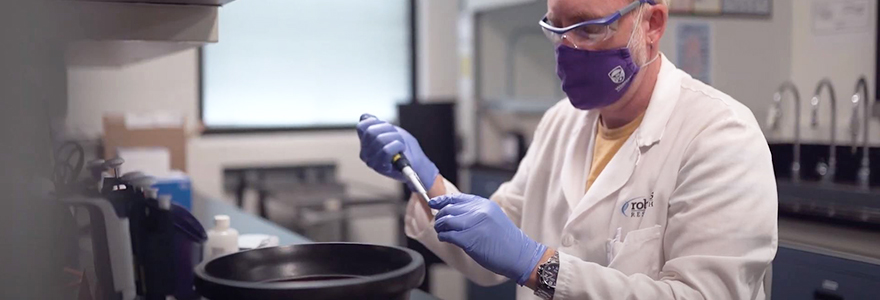Research Opportunities
Our Division continually strives to find new ways to improve the health of our renal patients, and better methods by which we deliver such care. Fellows in our program are afforded every opportunity to develop their skills in basic biological research, clinical research, and critical appraisal. Some fellows complete research electives, while others pursue Masters or Doctoral graduate degrees in additional research years after clinical training. With the support of Faculty internationally recognized for research, many fellows have also published as first author in the leading journals devoted to medicine, nephrology, epidemiology and basic biological sciences.
Research in Basic Science Laboratories
- Dr. Lakshman Gunaratnam, is a full time faculty, clinician scientist and an associate professor with the Division of Nephrology, Department of Medicine. He has a cross apointment with and the Department of Microbiology/ Immunology at Western University. Dr. Gunaratnam joined the Multi-Organ Transplant Program in 2010. Apart from general nephrology, his clinical and research interests are in acute kidney injury and kidney transplantation, in which he devotes considerable time conducting research on tissue repair in the setting of kidney failure and transplantation. He has won numerous awards including KRESCENT new investigator award and has published in high-impact papers in his field. Dr. Gunaratnam's research team hopes to identify therapeutic strategies to prevent kidney failure and increase the lifespan of transplanted kidneys. Visit The Gunaratnam Lab for more information.
- Dr. Anthony Jevnikar is the Co-Director of Multi Organ Transplant Program at London Health Sciences Centre and a scientist at the Robarts Research Institute and Lawson Health Research Institute. Researchers and scientists in Dr. Jevnikar’s lab work on discovering new treatments, including novel immune therapies, molecular 'fingerprinting' to identify how well patients respond to anti-rejection drugs and the ability to accept their new organs, possibly without long-term drugs. Nanotechnology approaches that improve organ preservation, and stem cells are being used to repair organs. Vist Matthew Mailing Centre for more information.
Next Generation Gene Sequencing for Genetic Kidney Disease
Research in the Kidney Clinical Research Unit

Dr. McIntyre and the KCRU Team: The team is comprised of many different individuals including postdoctoral researchers, academic doctors, PhD students, MSc students, physicians, coordinators, research nurses, and administrative assistants.
The London Kidney Clinical Research Unit (KCRU) is a 4000 square foot facility at the London Health Sciences Centre, Victoria Campus dedicated to biophysics and clinically oriented research. This unit fosters research by an integrated group of clinician investigators, research coordinators, administrators and programmers. Dr. Chris McIntyre is the current Director, who oversees the numerous active studies currently being coordinated through the unit.
Dr. McIntyre, in collaboration with the Visual Arts Department at Western University, embarked on a novel research study in 2017 in order to gain a better sense of the quality of life for people on chronic hemodialysis treatment and to better understand how they respond to treatment through imagery. The project allowed for a unique approach with the creation of an ongoing community of engaged patient partners living with kidney disease who have not only generated the amazing images but are helping to direct this visual approach. You may view this project at Renal Photo Community Initiative.
As well as having a strong local research community, the KCRU has developed an ever growing network of National and International research and healthcare connections to collaborate and share information with. The KCRU continues to move forwards and grow with the hope that the efforts of research will improve the lives and health of people with renal disease.
Research in the Provincial ICES (Institure for Clinical Evaluative Sciences) Kidney, Dialysis and Transplantation Program
After serving as the founding Director of the London Kidney Clinical Research Unit for over a decade, Dr. Amit Garg has gone on to become the Director of ICES Western and Lead of the Provincial ICES Kidney, Dialysis and Transplantation Program. The mission of ICES is translating data into trusted evidence that makes policy and health care better and people healthier.
ICES: the power of data to improve health.
For more information please visit https://www.ices.on.ca/
Dr. Garg uses his Master’s in Education, his experience with over 550 publications, and the activities of a large research program to deliver comprehensive mentorship to help trainees realize their professional goals. Over the past 16 years on Faculty at Western University, he has served as a primary research supervisor to 75+ trainees (clinician investigators, post-doctoral fellows, graduate students, residents, medical students and undergraduate students) who have achieved substantial academic success with his coaching.
Trainees benefit from the support of personnel skilled in research project execution and methods. The team includes biostatisticians, epidemiologists, a privacy officer, data coordinators, a health geographer and a patient engagement coordinator. Personnel are located at ICES Western and in a new Healthcare Research Studio at Victoria Hospital.
Current larger projects include improving the practice, safety and outcomes of living kidney donation; large-scale randomized trials embedded into routine healthcare delivery; peri-operative kidney medicine; and better drug prescribing in patients with kidney disease.









